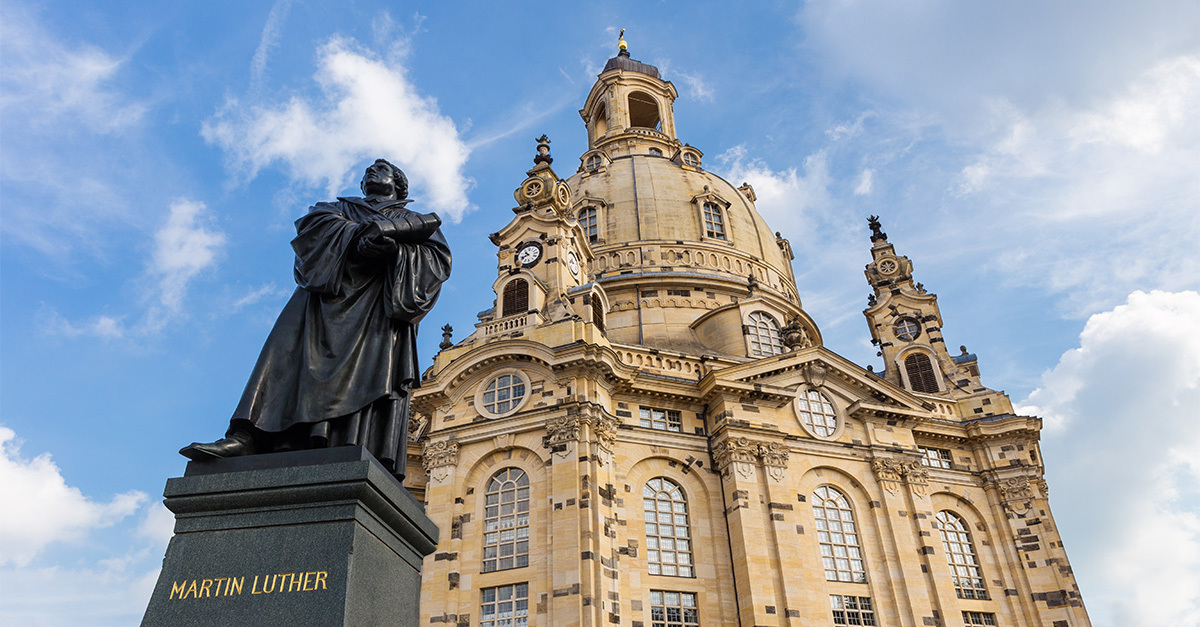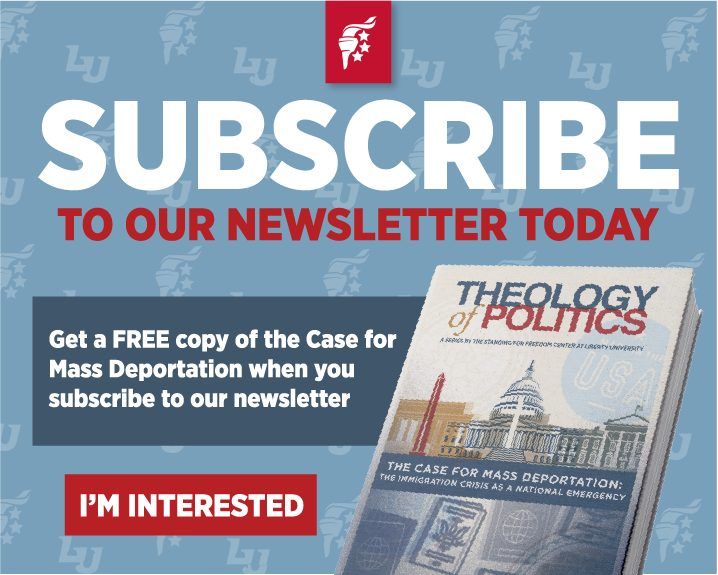“The Reformation gave birth to a newly recovered ecclesiological and theological movement — Protestantism. As Protestants, we prioritize the authority of Scripture over human tradition, God’s divine initiative in salvation over human effort, and the sufficiency of Christ’s saving work over any human effort to earn God’s grace.”
WILLIAM WOLFE
Introduction
“Sirs, what must I do to be saved?” That was the desperate question cried out by the Philippian jailer in Acts 16 after Paul, Silas, and the other prisoners had been miraculously freed by a divine earthquake. Approximately 1500 years later, it was the exact same question that drove Martin Luther — a Roman Catholic German monk tortured by the weight of his sins before a righteous God — to Romans 1:17. There, finally, he found the glorious doctrine of justification by faith alone.
Luther’s self-wrought chains of perpetual guilt finally fell away. He exclaimed: “I began to understand that the ‘justice of God’ meant justice by which the man lives through God’s gift, namely by faith…Here I felt that I was altogether born again and entered paradise itself through open gates” (Timothy George, Theology of the Reformers, 63).
Yet this soothing balm for Luther’s troubled soul — the biblical teaching that forgiveness and salvation are the free gifts of God, not earned by human merit — would not be constrained to the life and times of one man. No, it would prove to be the spark of the Reformation, lighting what Richard Sibbes called “that fire which all the world shall never be able to quench” (Michael Reeves, The Unquenchable Flame: Discovering the Heart of the Reformation, 191).
By questioning the method of securing God’s grace unto salvation in the life of a Christian, Luther — and subsequent Reformers — struck at the core of the entire Catholic religious and political system of the pope, priests, the Mass, sacraments, and indulgences, causing an existential crisis of authority. If sinners were made right by God on the basis of His free gift of grace, what need was there to participate in the costly and convoluted system of confession, penance, prayers, pilgrimages, and the purchase of indulgences? More significantly, what need was there for a pope? In answer to these questions came the outburst of Reformation theology, flowing from Luther, Zwingli, Calvin, Simons, Tyndale, Cranmer, etc., and birthing a new religious tradition and heritage — Protestantism, a name they earned by their protest.
Now, over 500 years after the start of the Reformation, the big picture results are obvious — the Protestant Reformation changed the world. But how has it changed your life? How has it reshaped your weekly experience at church? Part of better appreciating our heritage is understanding how it continues to play out in our lives today. So, let’s take a moment to zoom in and explore how the Reformation specifically reshaped our understanding of 1) the Church, 2) the role of the pastor, and 3) the administration of the sacraments (baptism and the Lord’s Supper).
How the Reformation Reshaped the Church
The Reformation reshaped our understanding of the Church in at least two substantial ways. First, it reordered the hierarchy of authority between God’s Word and the Church. Roman Catholic practice and tradition held that the Church, and ultimately the pope, was the highest authority in the life of a Christian, even over Scripture. This was reaffirmed at the Council of Trent in 1545, where “Rome’s voice rang out…reject[ing] the Reformation principle of sola Scriptura” (Michael Reeves, 181).
But Reformers, like Luther, came to understand that the truth was actually the other way around: “The church, far from having priority over the Scripture, is really the creation of Scripture, born in the womb of Scripture” (George, 82). While “the last thing in the world Luther wanted to do was start a new church,” it was this belief that ultimately led to Luther’s decisive break with Rome, realizing in his debate with John Eck in 1519 that he shared the same view as Reformation forerunner and condemned heretic John Hus on this matter (George, 87). It was from this doctrine of sola Scriptura that Luther and others were able to slowly recover the New Testament vision of the Church as a body of believers, who join together in submission to God’s Word, with the Church itself, in total, also in submission to God’s Word as well. Reestablishing the final supremacy of God’s Word for both the life of the individual Christian as well as the corporate gathering left no recourse to the Reformers than to leave the papal system and start new churches — Protestant churches.
A second way the Reformation reshaped our understanding of the Church was by exploring this fundamental question: Who gets to be a part of the local, visible church? Prior to the Reformation, national identity and church membership went hand in hand. You were born into the Holy Roman Empire, conferred citizenship in a town in France or Germany, etc., and baptized into the Roman Catholic Church, all in one fell swoop. Though Luther, Calvin, and Zwingli broke with Rome, they did not dispense with infant baptism as being an acceptable entryway into the life of the Church. And while we have records that Calvin did seek to exclude notable profligates from the Lord’s Supper — “I will die sooner than this hand shall stretch forth the sacred things of the Lord to those who have been judged despisers” — these magisterial Reformers did not advocate for (and, in fact, vehemently opposed) what is now the widespread Protestant practice of requiring baptism upon a profession of faith before allowing membership in a church (Reeves, 111).
The belief and practice of believer’s baptism was, in large measure, initially brought into the Reformation mix through figures like Felix Manz, who was drowned for his support of believer’s baptism, and notable Anabaptist leaders like Menno Simons. Summarizing Simons’ understanding of the Church, George writes that his view was that “the true church, then, was an intentional community consisting of regenerate members who willingly embraced a life of discipleship…” (George, 300). By preaching and practicing regenerate church membership, along with the belief that “faith does not follow from baptism but baptism from faith” and that “baptism is the public initiation of the believer into a life of radical discipleship” (something an infant was incapable of), the Anabaptists placed themselves in the crosshairs of both the mainstream Reformers and the Catholics, suffering severe persecution because of it (George, 303-304).
But now, over 500 years later, the largest Protestant denomination in America, the Southern Baptist Convention (SBC), stands as a testament to the vindication of the Anabaptists on this one point at least (and, of course, the English Baptists from which we are directly descended) — that the Church must be composed of only those who have been born again and are capable of making a personal, public profession of faith. Who should be considered part of the Church? Only those who are self-professing of a new life in Christ and demonstrate the profession with an act of baptism after conversion. Such an enduring impact could scarce have been imagined by Zwingli, who claimed that these radical re-baptizers threatened to overturn everything.
How the Reformation Reshaped the Role of the Pastor
One enduring way the Reformation shaped Protestant beliefs about the office of the pastor was to establish the main role of the pastor as that of faithful expositor of God’s Word. The principle of sola fide (faith alone) dispensed with the need of priestly practices for the absolution of sins. This led to jettisoning the observation of the Catholic Mass as the main purpose for gathering. Thus, the Reformers came to understand that preaching God’s Word rightly to the people in a language they could understand was the primary responsibility of the pastor.
Few Reformers embodied this better than John Calvin: “The importance of preaching in Calvin’s thought can hardly be exaggerated” (George, 251). After laboring in Geneva for less than two years, Calvin was, for a time, expelled, so he sought refuge in Strasburg. Yet just three years later, Geneva asked for him to return. Calvin reluctantly agreed, and in 1541, resumed his role as pastor and walked back into his pulpit. With great anticipation by the people as to what his first words upon returning would be, Reeves writes that “the congregation braced themselves for the torrent of anathemas that must surely come from an embittered deportee now given a public voice. Instead, Calvin simply took up the exposition of the next verse which followed his previous passage, from three-and-a-half years before.” The message was as clear as could be: Calvin returned with no personal agenda (far from it!) but had come as a preacher of God’s Word. In fact, “Calvin preached more than 200 times per year and lectured through nearly the entire Bible” (Jon Balserak, Calvinism: A Very Short Introduction, 4).
Calvin was no exception amongst the early Reformers, as Zwingli equally prioritized preaching as the primary function of a pastor, claiming “Lo, here you have the Scripture as master and teacher and guide, not the Fathers, not the misunderstood Church of certain people” (George, 131). Zwingli also “abandoned the traditional lectionary in favor of a chapter-by-chapter exposition of Scripture” (George, 131). In the decades to come, the English Reformers carried on this understanding. After the death of King Henry VIII in 1547, Thomas Cranmer worked with Lord Protector Edward Seymour to institute Protestant reforms in England. Reeves writes that “Preaching was commanded in English, and many notable preachers, such as Hugh Latimer, started to become household names…And for those getting ordained, there was a new expectation: now it was clear that becoming a minister was not about a priest who offers sacrifices (in the Mass), but primarily about preaching” (Reeves, 134-135).
This understanding of the primary role of a pastor continued on through the Puritans, in the likes of Richard Sibbes in the 17th century, to Jonathan Edwards in the 18th century, Charles Spurgeon in the 19th, Martin Lloyd Jones in the 20th, and now to us today, with men like John MacArthur. Since God’s Word is the only infallible rule for life and practice, and since God’s Word is what shapes the Church, God’s man in the pulpit, the pastor, is now first and foremost a preacher of this Word.
How the Reformation Reshaped the Sacraments
The Reformation also led to a decisive shift in how Protestants understood the nature and practice of these cardinal marks of the Church, not the least by changing the terminology of “sacraments” to “ordinances.” The Roman Catholic Church taught that were seven sacraments: baptism, confirmation, the Mass, penance, marriage, ordination, and last rites, which functioned as “taps of grace” administered by the priests into the life of the Christian (Reeves, 18). The initial sacrament, infant baptism, was salvific in the sense that it removed the guilt of original sin from the individual, who then had to persevere in the penitential system, with confession and penance, and attendance of the Mass, in order to continue to receive grace and forgiveness of sins.
But, with almost universal agreement, the Reformers rejected all but baptism and the Lord’s Supper as authentic sacraments. In their retention of these two, they advocated for a fundamentally different understanding of the nature and purpose of both. Baptism and the Lord’s Supper were no longer a means of receiving faith but rather the expression of a faith already confessed. Luther argued that “You can believe even though you are not baptized, for baptism is nothing more than an eternal sign which reminds us of the divine promise” (George, 93). While the Reformers fractured on their understanding of baptism, whether it was for infants or adult believers, they all rejected the teaching of Rome that baptism provided forgiveness of sins. Outside of a few fringe denominations today, such as the Church of Christ, this is the prevailing position and understanding of baptism held globally by Protestants.
Regarding the Lord’s Supper, the Reformers made a radical change in advocating for the masses to receive both the bread and the wine, and on a regular basis. Previously, the practice of the Catholic Church was to perform the sacrament in front of the people, only allowing participation once a year, and even then, just to receive the bread — “after all, what if some ham-fisted peasant spilt the blood of Christ on the floor?” (Reeves, 19). More significantly, the Reformers rejected the Catholic teaching of transubstantiation, the idea that the bread and wine were transformed in their essence into the literal body and blood of Christ. “As regards the Lord’s supper, Calvinists hold a number of different positions, but all are united against the Roman Catholic position, known as transubstantiation…Instead they usually teach that through the bread and wine believers are raised up spiritually to a deeper fellowship with Jesus Christ, who is in heaven” (Balserak, 52).
Disagreements over the exact nature of Christ’s presence in the bread and wine divided Luther and Zwingli, with the former believing the body and blood of Christ join with the bread and wine, a process called consubstantiation, and the latter arguing for a purely symbolic or memorialist understanding. Between the two sat Calvin, who advocated for a spiritual presence, as alluded to by the previous quotation. Amongst Protestants today, the dominant understanding of the Lord’s Supper is either a memorialist or spiritual presence position.
Conclusion
The echoes of Luther’s hammer on the Wittenberg Door, as he nailed the 95 Theses that God-ordained October day, can still be heard in our own lives every time we step into a church on Sunday. Because the Reformation didn’t just reshape our understandings of the Church, the pastor, and the sacraments, but rather it gave birth to a new ecclesiological and theological tradition. This tradition is one that prioritizes the authority of Scripture over human tradition, God’s divine initiative in salvation over human effort, and the sufficiency of Christ’s saving work over any human works to merit saving grace. I say “new,” but, in fact, it is as old as Christianity itself. Because what we gained from the Reformation was, in fact, not new, but rather was the recovery of biblical Christianity, drawn directly from the divine source of Scripture, the “supreme standard by which all human conduct, creeds, and religious opinions should be tried.”
Faithful Protestants today continue in this new-yet-recovered trajectory. We teach that the Church is under submission to the authority of God’s Word (and for those of us who are Baptists, we contend that the visible local gathering should be composed of the regenerate). We prioritize the role of a pastor as an expositor of God’s Word. And we properly administer the ordinances of baptism and the Lord’s Supper, not as means of saving grace but as “tall guideposts along life’s highway” (George, 94). These Reformation recoveries, this reshaping of our lives and teaching as Christians, have served as guideposts for over 500 years so far. And should the Lord tarry, we trust that they will continue to guide the way for 500 more years yet to come.
Resources used for this article
Timothy George, Theology of the Reformers
Michael Reeves, The Unquenchable Flame: Discovering the Heart of the Reformation
Jon Balserak, Calvinism: A Very Short Introduction
Follow William on Twitter! @William_E_Wolfe





